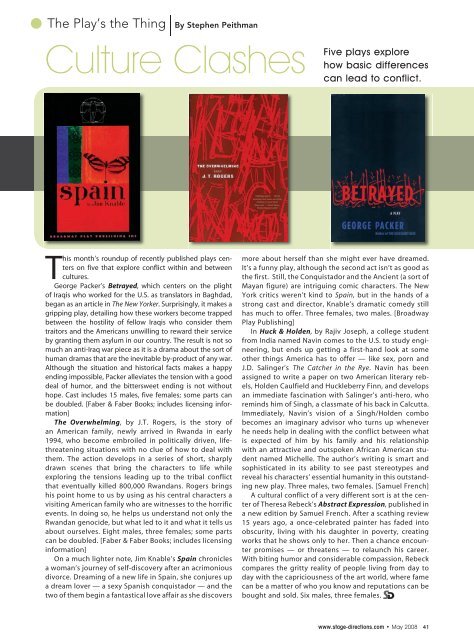Download a PDF - Stage Directions Magazine
Download a PDF - Stage Directions Magazine
Download a PDF - Stage Directions Magazine
Create successful ePaper yourself
Turn your PDF publications into a flip-book with our unique Google optimized e-Paper software.
The Play’s the Thing<br />
By Stephen Peithman<br />
Culture Clashes<br />
Five plays explore<br />
how basic differences<br />
can lead to conflict.<br />
This month’s roundup of recently published plays centers<br />
on five that explore conflict within and between<br />
cultures.<br />
George Packer’s Betrayed, which centers on the plight<br />
of Iraqis who worked for the U.S. as translators in Baghdad,<br />
began as an article in The New Yorker. Surprisingly, it makes a<br />
gripping play, detailing how these workers become trapped<br />
between the hostility of fellow Iraqis who consider them<br />
traitors and the Americans unwilling to reward their service<br />
by granting them asylum in our country. The result is not so<br />
much an anti-Iraq war piece as it is a drama about the sort of<br />
human dramas that are the inevitable by-product of any war.<br />
Although the situation and historical facts makes a happy<br />
ending impossible, Packer alleviates the tension with a good<br />
deal of humor, and the bittersweet ending is not without<br />
hope. Cast includes 15 males, five females; some parts can<br />
be doubled. [Faber & Faber Books; includes licensing information]<br />
The Overwhelming, by J.T. Rogers, is the story of<br />
an American family, newly arrived in Rwanda in early<br />
1994, who become embroiled in politically driven, lifethreatening<br />
situations with no clue of how to deal with<br />
them. The action develops in a series of short, sharply<br />
drawn scenes that bring the characters to life while<br />
exploring the tensions leading up to the tribal conflict<br />
that eventually killed 800,000 Rwandans. Rogers brings<br />
his point home to us by using as his central characters a<br />
visiting American family who are witnesses to the horrific<br />
events. In doing so, he helps us understand not only the<br />
Rwandan genocide, but what led to it and what it tells us<br />
about ourselves. Eight males, three females; some parts<br />
can be doubled. [Faber & Faber Books; includes licensing<br />
information]<br />
On a much lighter note, Jim Knable’s Spain chronicles<br />
a woman’s journey of self-discovery after an acrimonious<br />
divorce. Dreaming of a new life in Spain, she conjures up<br />
a dream lover — a sexy Spanish conquistador — and the<br />
two of them begin a fantastical love affair as she discovers<br />
more about herself than she might ever have dreamed.<br />
It’s a funny play, although the second act isn’t as good as<br />
the first. Still, the Conquistador and the Ancient (a sort of<br />
Mayan figure) are intriguing comic characters. The New<br />
York critics weren’t kind to Spain, but in the hands of a<br />
strong cast and director, Knable’s dramatic comedy still<br />
has much to offer. Three females, two males. [Broadway<br />
Play Publishing]<br />
In Huck & Holden, by Rajiv Joseph, a college student<br />
from India named Navin comes to the U.S. to study engineering,<br />
but ends up getting a first-hand look at some<br />
other things America has to offer — like sex, porn and<br />
J.D. Salinger’s The Catcher in the Rye. Navin has been<br />
assigned to write a paper on two American literary rebels,<br />
Holden Caulfield and Huckleberry Finn, and develops<br />
an immediate fascination with Salinger’s anti-hero, who<br />
reminds him of Singh, a classmate of his back in Calcutta.<br />
Immediately, Navin’s vision of a Singh/Holden combo<br />
becomes an imaginary advisor who turns up whenever<br />
he needs help in dealing with the conflict between what<br />
is expected of him by his family and his relationship<br />
with an attractive and outspoken African American student<br />
named Michelle. The author’s writing is smart and<br />
sophisticated in its ability to see past stereotypes and<br />
reveal his characters’ essential humanity in this outstanding<br />
new play. Three males, two females. [Samuel French]<br />
A cultural conflict of a very different sort is at the center<br />
of Theresa Rebeck’s Abstract Expression, published in<br />
a new edition by Samuel French. After a scathing review<br />
15 years ago, a once-celebrated painter has faded into<br />
obscurity, living with his daughter in poverty, creating<br />
works that he shows only to her. Then a chance encounter<br />
promises — or threatens — to relaunch his career.<br />
With biting humor and considerable compassion, Rebeck<br />
compares the gritty reality of people living from day to<br />
day with the capriciousness of the art world, where fame<br />
can be a matter of who you know and reputations can be<br />
bought and sold. Six males, three females.<br />
www.stage-directions.com • May 2008 41
















